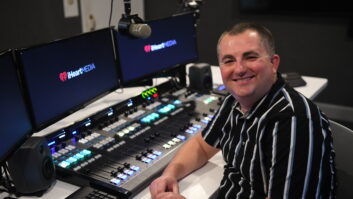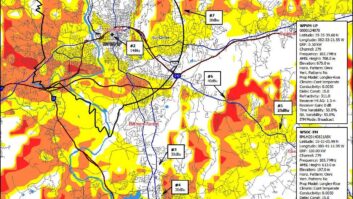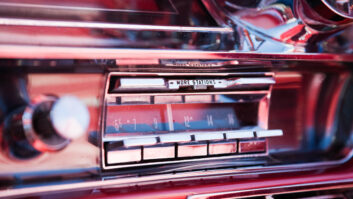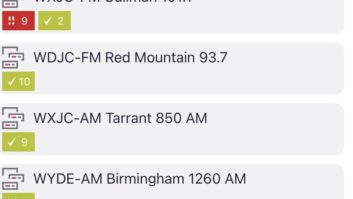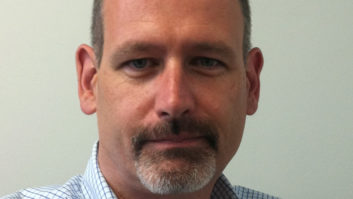For years, Ibiquity Digital Corp. and its former incarnation USA Digital Radio have pursued several paths in the hope of making in-band, on-channel the terrestrial radio digital technology for the United States.
In Ibiquity’s view, this is the year those paths converge.
Among the groups talking to or involved with Ibiquity are transmission and receiver equipment manufacturers, radio owners, the FCC, the standards-setting body of engineers on the National Radio Systems Committee, chip makers and car makers.
Ibiquity is a privately held company with funding from most of the major radio groups, plus Harris Corp. and venture capitalists. Recently, Ford Motor Co. took an undisclosed equity position in the company.
Convert in Q4?
Several things must happen if Ibiquity is to realize its hope of converting approximately 100 stations in Chicago, Los Angeles, Miami, New York, Seattle and San Francisco in the fourth quarter.
Ibiquity wants to give IBOC something resembling a national footprint as soon as possible. One NRSC source said Ibiquity wants to put the technology on enough stations to gain 50 percent of the listeners in each of those markets.
Subsequent markets would include Atlanta, Boston, Dallas, Denver and Detroit.
At present, the engineers evaluating Ibiquity’s AM IBOC system is reviewing test results. As it did for FM tests, the NRSC plans to determine whether Ibiquity’s AM system is measurably better than analog and hopes to issue a public report on the system by early April.
While Ibiquity hoped the NRSC would finish reviewing its AM system in less time than it did for FM, the NRSC said the review has to be thorough.
“In many ways, AM is more complicated than FM, although the structure for (the AM report) will be the same as for FM,” said NRSC Chairman Charles Morgan.
Sources from the NRSC, NAB and Ibiquity agreed the FCC acted quickly in seeking public comment on the NRSC report on Ibiquity’s FM system. They expected the agency to act as quickly on the AM system report, perhaps in April.
Ibiquity hopes the FCC will issue an endorsement for IBOC this summer, and craft final rules by the end of the year.
FCC officials do not comment on what the commission might do specifically. But consistently, FCC staff engineers and commissioners have indicated that the agency wants to help radio with the digital transition, that they recognize the importance of DAB and have confidence in the NRSC. At the same time, the FCC staff says they want to do it right.
NRSC sources believe the FCC has IBOC on a fast track and is prepared to devote considerable resources to crafting transition requirements, though the exact regulatory path for the IBOC transition is unclear.
For example, the first stations that convert might need to do so on an experimental basis, by going through a Special Temporary Authorization application process, according to several sources. But at the same time, the commission would not want to be deluged with STA applications, so Ibiquity is believed to be discussing other transition mechanisms with the FCC.
How long might the FCC process of crafting IBOC rules take? It’s hard to say.
“Once the FCC gets the comments, if there are no real problems, things should move quickly. If not, the FCC will have to resolve problems,” said Morgan.
One potential problem being handled now is how Ibiquity’s FM system would affect SCA receivers given out by radio reading services for the blind and sight-impaired. Previous tests were inconclusive, so new tests with more receivers were being conducted by the Advanced Television Technology Center in February.
Transmitter manufacturers Harris, BE and Nautel plan to have IBOC-compatible gear for sale at NAB2002. All three have licensing agreements with Ibiquity.
Ibiquity declines to state how much the transmitter makers are paying for the right to its technology, saying such agreements are proprietary.
Typically, Ibiquity Senior Vice President Jeff Jury said, there are not “huge fluctuations” in how much each company pays Ibiquity “because market forces tend to drive things to an acceptable price.”
Companies aligning with Ibiquity usually start with a development deal to explore the feasibility and cost-effectiveness of making IBOC-compatible equipment. Later, the deal can become a more formal licensing agreement that allows the manufacturer to use Ibiquity’s intellectual property in its equipment.
Ibiquity is working with other transmitter manufacturers as well as companies that make filters, combiners and STLs. While easier to roll out the technology with a few companies at first, Ibiquity expects to license more companies to manufacture IBOC-compatible equipment.
NRSC sources agreed Ibiquity is confident that the industry and the FCC will endorse IBOC, but say licensing agreements probably are contingent upon FCC approval of the technology.
It’s growing increasingly likely, sources said, that the commission will want to see a formal standard for IBOC, and perhaps ask the NRSC to set that standard.
That would require Ibiquity to share more-detailed information with the NRSC about how its system works. Given that the NRSC already holds much data, the normal three- to six-month standard-setting process might be shorter and could occur along with the early rollout, sources said.
Stations that want to go digital also must pay Ibiquity a licensing fee, based on station class, much like the FCC’s annual regulatory fees. The total average station fee would be roughly $10,000 to $12,000, which could be spread over a period of years.
“We are in discussions with all the major broadcast groups and are moving forward to having agreements in place with as many groups as possible,” said Jury.
For any of this to succeed, however consumers also must hear IBOC. Ibiquity plans to have IBOC receivers ready for the 2003 Consumer Electronics Show in January and has licensing deals with Harmon Kardon, Kenwood and Visteon.






